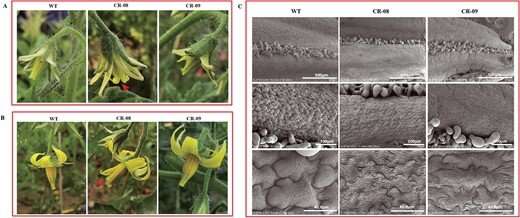
Recently, scientists from Shanxi Datong University and Chongqing University revealed that SlCMT4, which encodes a DNA methyltransferase responsible for de novo and non-CG methylation, plays an important role in diverse developmental processes of tomato. The study was published in Horticulture Research.
SlCMT4 (Solyc08g005400.2) was mutated in cv. 'Ailsa Craig' using the CRISPR/Cas9 system to confirm its function. Severe developmental defects were found in the SlCMT4 mutants, including small and thick leaves, increased lateral buds, defective stamens and pistils, small fruit size with reduced setting rate, and defective seed development. Alterations in hormone levels (IAA, tZR, strigol) were consistent with the multibranching phenotype of the SlCMT4 mutant plants.
CRISPR-Cas9-mediated knockout of SlCMT4 induced the expression of two pollen-specific genes (PMEI and PRALF) that suppressed pollen wall development and pollen tube elongation, causing irregular and defective pollen. Transcriptome sequencing was used to study the transcript levels of tomato fruit ripening-related genes, and a number of ripening-related genes (such as PE1, PG2, and LOXB) were upregulated in the CR-08 mutant line.
Whole-genome bisulfite sequencing (WGBS) of fruits revealed that SlCMT4 knockout reduced genome-wide cytosine methylation, particularly CHH methylation. A reduction in methylation was also observed in a 2-kb region of the IMA and LOXB promoters in the SlCMT4-mutant fruits, indicating that the hypermethylation status of the CHH context was critical for the inhibition of IMA and LOXB promoter activity.
"This study clarified that SlCMT4 can cooperate in the epigenetic regulation of tomato fruit growth, development, and ripening by regulating the methylation patterns of key transcription factors," the researchers said.
In brief, this study showed that SlCMT4 is required for normal development of tomato vegetative and reproductive organs.
Explore further
Provided by Nanjing Agricultural University The Academy of Science
Citation: Regulation of fruit development and ripening by DNA methylation (2022, August 23) retrieved 23 August 2022 from https://ift.tt/sbO7SWf
This document is subject to copyright. Apart from any fair dealing for the purpose of private study or research, no part may be reproduced without the written permission. The content is provided for information purposes only.
"fruit" - Google News
August 24, 2022 at 12:54AM
https://ift.tt/sbO7SWf
Regulation of fruit development and ripening by DNA methylation - Phys.org
"fruit" - Google News
https://ift.tt/c8dbvLM
https://ift.tt/cmvikGo
Bagikan Berita Ini














0 Response to "Regulation of fruit development and ripening by DNA methylation - Phys.org"
Post a Comment